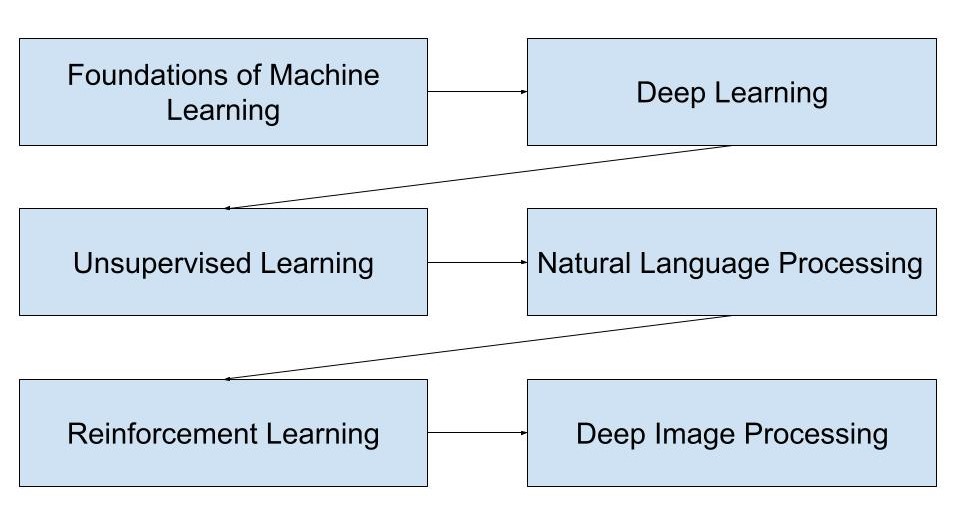Certificate in Machine Learning
Teach your machines to work for you
11 July 2022 - 31 March 2023
Current technologies are quickly catching up to what 20 years ago was the stuff of sci-fi movies.
The way Netflix knows what you want to watch next, how Amazon knows what you want to buy, or how easy it is for Google to find a picture of your covid vaccine card among several thousand photos--these are possible through a discipline known as Machine Learning.
The era of Artificial Intelligence is here. Do you know what to do with it?
Machine learning is a pathway to artificial intelligence (AI). This subcategory of AI uses algorithms to automatically learn insights and recognize patterns from data, applying that learning to make increasingly better decisions.
Government, finance, retail, healthcare, energy, and transport sectors are using machine learning to identify trends and gain insights.
- Healthcare organizations track patients' health in real-time and quickly pick up on red flags.
- Energy companies let machines find new energy sources, streamline distribution, and root out problems in refineries.
- Banks and governments use machine learning to increase efficiency and detect fraud, including identity theft.
- Retail outlets let machine learning convert data into a personalized shopping experience and optimize profit per customer.
- Transportation agencies are able to choose the most efficient routes and thereby increase profits.
Industry uses for machine learning are many--and will continue to increase.
Machine Learning Is a Growing Field
According to Simplilearn, machine learning jobs have jumped about 75% since 2017, including a steep climb since the pandemic.
If you're looking for a well-compensated job that is changing the world and poised to provide opportunities for years to come, look into machine learning.
Start with Texas Tech University's Machine Learning certificate program. Contact us now.
Texas Tech University-Costa Rica's Machine Learning certificate is an entry-level program suitable for all learners.
The certificate in machine learning consists of a series of 6 modules that cover theoretical foundations of artificial intelligence (AI) systems as well as practical tools you can apply to your professional area.
- The modules in this program go beyond the fundamentals of machine learning to introduce specific application areas.
- To obtain the Machine Learning Certificate, most students must take all six courses in the order shown below.

- When you earn a certificate, you also receive 6 CEUs.
- The Fundamentals of Machine Learning and Deep Learning courses form the program's core. Students must complete these modules before the others.
- Deep Image Processing is the last module. It will be imparted in 2023.
If you're not sure about earning a certificate but still want a taste of machine learning, enroll in the first module, “Fundamentals of Machine Learning.”
Class Meetings
- Duration: Wednesday evenings from July 13, 2022, to March 29, 2023 (38 weeks total).
- Mode of Instruction: Live, online
- Language of Instruction: English. Confirm your English proficiency by taking this free test: https://www.examenglish.com/leveltest/index.php. You should earn a grade of A2 or better.
- Price: Pay $5,000 + IVA for the entire certificate program (6 month-long modules) or $1200 + IVA per module. Note: Only those who complete the certificate will earn CEUs. CEUs are NOT awarded for individual courses.
- Prerequisites: Basic Python and high school level algebra. If you need to learn Python, please enroll in Python.
This program will not be offered again this year, and seats are limited. Get more info here.
Professor Juan Carlos Rojas
Juan Carlos Rojas has a Ph.D. from Northeastern University and a master's degree from Stanford University. He has worked for more than 20 years in the high-tech industry.
Rojas specializes in digital signal processing, real-time embedded computing, and artificial intelligence. At Texas Tech, he is a full-time lecturer in electrical engineering and computer science.
Contact us to enroll or get on the waiting list.
Costa Rica
-
Address
Avenida Escazú, Edificio AE205 San José, San Rafael de Escazú, Escazú 10201- Costa Rica -
Phone
+(506) 2519-9900 -
Email
Info.CostaRica@ttu.edu
